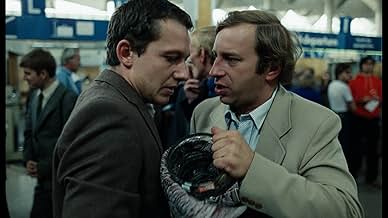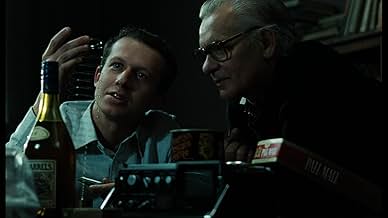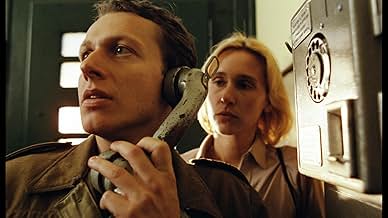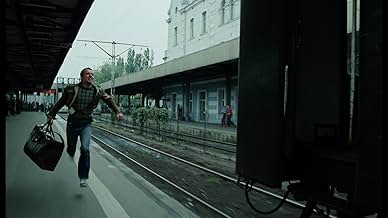Witek persigue a un tren. Se siguen tres variaciones de cómo un incidente tan aparentemente banal podría influir el resto de su vida.Witek persigue a un tren. Se siguen tres variaciones de cómo un incidente tan aparentemente banal podría influir el resto de su vida.Witek persigue a un tren. Se siguen tres variaciones de cómo un incidente tan aparentemente banal podría influir el resto de su vida.
- Dirección
- Guionista
- Elenco
- Premios
- 2 premios ganados en total
- Dirección
- Guionista
- Todo el elenco y el equipo
- Producción, taquilla y más en IMDbPro
Opiniones destacadas
In the Olympics, it's the difference between a gold medal and 10th place.
In the movie Blind Chance, it's the difference of a lifetime.
An example of expert craftsmanship by Krzysztof Kieslowski, Blind Chance affords us the rare opportunity to see how a blip in time, a mere split second, can profoundly affect a person's current situation, and the path their life will take from that moment forward.
While the significance of sliced seconds is shown, we get to enjoy some quality time with the communist party, the anti-communist underground, some lovely ladies sans attire, and a mob of disgruntled drug addicts. We are also treated to one or more Slinkies going down stairs alone or in pairs. Indeed, it's quite a blend of characters, motives, and ideologies. However, it is not the point of the film to take sides, make moral statements, or ponder idealistic philosophies. The point is merely to illustrate its premise.
Let there be no doubt that the premise is more than adequately served. From top to bottom, beginning to end, Blind Chance is a fantastic film, an entertaining drama that encourages thought, while not being overbearing.
Just be sure to pay close attention, because a fraction of a second can also be the difference between understanding this film and missing the point entirely.
However, "Blind Chance" is, ultimately, a political film. Although Kieslowski never really considered himself a political film-maker (compared to some of his contemporaries), "Blind Chance" is very much driven by political undercurrents and the outcome of each scenario has a decidedly political aspect. That said, the film transcends the immediate political situation in Poland as well and elevates "politics" to a much broader all-encompassing level. It is really not Polish politics that concern Kieslowski here, but the human being's capacity for taking action. Each scenario presents a possible course of action (or non-action). Kieslowski doesn't seem to endorse one course over the other, but makes a much broader statement about the need to take action, to believe in something, and to fight for something. What one is fighting for, what one believes in, ultimately isn't as important as the fight itself.
A brilliant and highly thought-provoking film. In my opinion, one of Kieslowski's most accomplished and densely-packed works. I hope that anyone who didn't appreciate "Blind Chance" will give it another chance (I've watched it at least ten times). It is not the most accessible film, but the pay-off is worth the effort.
The only flaw that I can think of is the fact that this film is probably very hard to understand for non-Poles as it is so very... Polish. And although the message the movie tries to convey seems to be more universal, you probably cannot get the whole of it if you were not born in a country located between Russia and Germany.
And if you compare this one to last year Peter Howitt's flick "Sliding Doors"... See how films of similar content can differ?
What did one reviewer mean by saying that we could not understand fully? i know that is probabaly true and would like to know
¿Sabías que…?
- TriviaAlthough the movie was made in 1981, it had its premiere in 1987. The delay was because of state-imposed censorship due to the film's political content.
- Citas
1. Werner: I intend to give you my current thoughts on an idea I've been committed to for 40 years. Every generation yearns for light. It needs reassurance and faith that the world can be better and a fairer place. This yearning which is older than Marx and younger than Marx, is like a drug. Early in life it brings joy, because the light seems so near and within reach. At life's end it brings bitterness, because the light has grown once again. In these 40 years I've lived through many things and the light seems further away than ever before, and thus I shouldn't encourage you, but you can be sure of one thing: without bitterness and this hope, life would be pitiful indeed.
- Versiones alternativasThe film was scheduled for release in 1981, but was suppressed by the Polish government due to its criticism of Communist regime. The film was eventually released in 1987 with some of the politically sensitive material cut (these cuts totalling roughly 9 minutes). The film has since been released in a uncut form, however one of the scenes involving Witek being beaten by the train guard remains lost.
- ConexionesFeatured in Arena: The Ten Commandments of Krzysztof Kieslowski (1990)
Selecciones populares
- How long is Blind Chance?Con tecnología de Alexa
Detalles
Contribuir a esta página


































